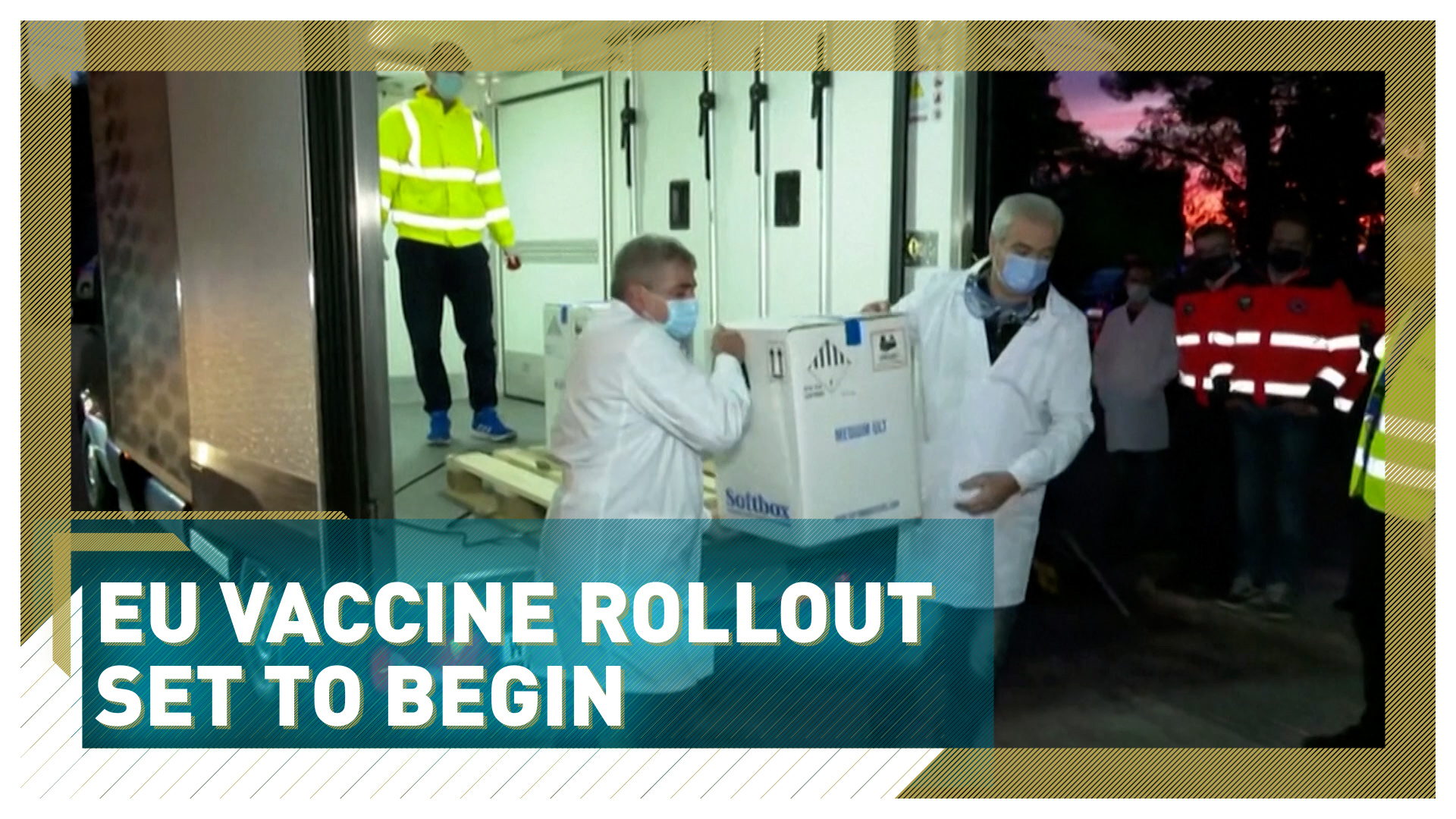03:03

Vaccinations against the COVID-19 virus, which has caused havoc around the world, will start being rolled out in all 27 European Union countries on Sunday (December 27).
Millions of doses of the Pfizer/BioNTech vaccine are being prepared for patients across the bloc, even as some countries have been forced back into lockdown by a new strain of the virus. More than 25 million total infections have been recorded in Europe this year.
EU regulators approved the Pfizer-BioNTech vaccine on December 21, meaning that Europeans have had to wait longer than those in the U.S. or UK to be inoculated.

Medical workers unbox packages of Pfizer/BioNTech COVID-19 vaccines in Athens. /Angelos Tzortzinis/AFP
Medical workers unbox packages of Pfizer/BioNTech COVID-19 vaccines in Athens. /Angelos Tzortzinis/AFP

Workers open a box of the first shipment of COVID-19 vaccines near Paris. /Stephane De Sakutin/POOL/AFP
Workers open a box of the first shipment of COVID-19 vaccines near Paris. /Stephane De Sakutin/POOL/AFP

Boxes of Pfizer/BioNtech vaccine unloaded following its arrival in Cyprus. /Stavros Ioannides/AFP/PIO
Boxes of Pfizer/BioNtech vaccine unloaded following its arrival in Cyprus. /Stavros Ioannides/AFP/PIO

Spanish Health Ministry official holds a dose of the Pfizer/BioNtech vaccine. /Jose Maria Cuadrado Jimenez/Spain Health Ministry/AFP
Spanish Health Ministry official holds a dose of the Pfizer/BioNtech vaccine. /Jose Maria Cuadrado Jimenez/Spain Health Ministry/AFP

Medical staff receive part of a vaccine shipment at the UZ Leuven Hospital. /Nicolas Maeterlinck/Pool via AP
Medical staff receive part of a vaccine shipment at the UZ Leuven Hospital. /Nicolas Maeterlinck/Pool via AP

Hungarian head physician Adrienne Kertesz receives a vaccine at Southern Pest Central Hospital, Budapest. /Szilard Koszticsak/MTI via AP
Hungarian head physician Adrienne Kertesz receives a vaccine at Southern Pest Central Hospital, Budapest. /Szilard Koszticsak/MTI via AP
CLICK RIGHT TO SCROLL THROUGH OUR PICTURE GALLERY
European Commission President Ursula von der Leyen said on Saturday that the vaccination rollout will allow Europe to start to turn the page on a difficult year.
"Our European Union vaccination days are a touching moment of unity and a European success story," she said. "The European Union has secured enough doses of vaccine for our whole population of 450 million people."
However, Von der Leyen warned that the fight against coronavirus is far from over. "We have to continue to be careful," she cautioned. "We need to protect ourselves and our loved ones from the virus. Let's stay safe together."
The vaccination will initially be given to elderly patients, especially those in nursing homes – a Europe-wide priority to protect the most vulnerable.

It will come as a major relief for Europeans, who have witnessed in recent months a deadly resurgence of COVID-19, coupled with the spread of the new strain, which is believed to be more infectious. Cases have been reported in France, Germany, Spain, Denmark and the Netherlands, despite travel restrictions imposed on the UK where the strain was first reported.
First doses of the Pfizer/BioNTech vaccine arrived across the continent on Saturday morning ready for distribution to elderly care facilities and hospital staff.
As health workers hurriedly finalized preparations, Germany's Health Minister Jens Spahn said the first doses of the vaccine had been distributed to the country's 16 states.
"There really is a happy Christmas message," he said. "This vaccine is the crucial key for defeating the pandemic. It's the key for us getting back our lives."
"We'll get our freedom back, we'll be able to embrace again," Italian Foreign Minister Luigi Di Maio added.
In the Vatican on Christmas Day, Pope Francis pleaded for "vaccines for all" in his traditional Christmas message.
"I call on everyone, on leaders of states, on businesses, on international organizations, to promote cooperation and not competition, to find a solution for everyone... especially the most vulnerable and most in need in all regions of the planet," Pope Francis said.
The latest figures published by EU agency the European Centre for Disease Prevention and Control show that a total of 403,990 people across the bloc have been killed by the virus.
Video editor: Nuri Moseinco
Source(s): AFP

